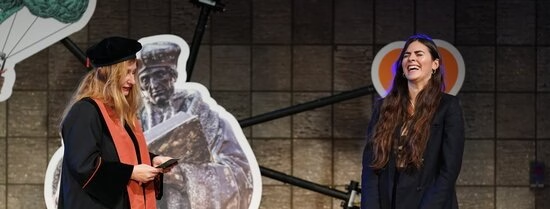This year’s FAME Athena Award winner is Maria Carmen Punzi. “By fostering an honest conversation about menstrual health, a topic that is often stigmatized or overlooked, you help break down barriers and encourage open dialogue about a crucial aspect of women's lives.” With the Athena Award, FAME (Females in Academia Moving towards Equity) celebrates staff members and students who stimulate female talent within the academic environment and who are a true example for others.
The FAME Athena Award was presented to Maria Carmen Punzi during the Dies Natalis by Chief Diversity Officer Semiha Denktaş: "You have been one of the people who ensured there are free menstrual products available at our university. And with your Instagram channel and appearances in several media you go beyond your work at our university. You push forward academic communication in social media, making these important conversations more accessible and relatable to a wider audience."
Maria Carmen Punzi received a painting by Sofja Wolsky and the official certificate of the FAME Athena Award. We interviewed her about her work, about winning the award and about challenges women face at our university.
"At EUR I always felt that I could be completely myself, that I could challenge the status quo"
Maria Carmen Punzi
Winner of the FAME Athena Award 2023
What does winning this prize mean to you?
I first set foot on campus at 20 years old (2015), during my exchange semester, the first time I was living abroad. I knew so little and yet I was so mesmerized by the colors, the vibrancy and the sense of possibility I felt here. This university has seen me grow into the researcher, lecturer and activist I am: at EUR, I have always felt l could be my full self, I could challenge the status quo and I could put new topics, new ways of thinking and seeing the world on the table.
For this reason, I am absolutely honored to have won this prize, especially knowing how many brilliant women work in this institution and fight for equity and justice. Receiving it in the last year of my PhD, also feels like a circle closing, a confirmation that, while sometimes combining research, education and social impact can feel ‘too much’ or like you’re pushing against an invisible wall, this work is seen, deeply appreciated and recognized.

In your work at EUR, what are you most proud of?
I am very proud to have brought the topic of menstrual health and equity to Erasmus University. I have worked hard to demonstrate that it is a topic worth researching, relevant in a social sciences school, fundamental to achieving gender equality, and also key to social and environmental sustainability.
And you know what I got in return? Countless inspiring, vulnerable conversations with peers first, then other faculty members, then my own students. Stories, connection, recognition. Talking about menstrual health in papers, class, and on campus profoundly connected me to the EUR community. Of course, I also must mention that, with wonderful co-conspirators Ana Uribe Sandoval, the University Council and Erasmus Verbindt, we advocated and obtained free menstrual products for students and faculty on campus, supported by the university board. I still can’t believe it!
What do you see as a challenge for women at EUR?
Not replicating the structure of power, oppression and exclusion that we as women and people socialized as females have had to, and still have to fight against. I think that’s one of the most challenging parts of fighting for gender equity: simultaneously recognizing the privilege that we enjoy, based on ethnicity, class, wealth and education level.
When you are raised to believe only few women can make it to the top, it’s hard to make space for collaboration, it can feel challenging to help and lift others, because there is an underlying fear that they can take your place. How do we make space for a promising young female student who had a good research intuition? How can we pass on an opportunity to speak, be on stage or be consulted, and pass the mic to a colleague of color or from a marginalized group? How can we do all of this without feeling like we will lose our own spot, our opportunity? This is a question I still sit with, and I think it’s a vulnerable one that everyone should contemplate.
Is there something you would like to say to inspire other women at EUR?
Cultivating self-trust has the potential to change both your career and your life. While we all must fight to overcome the structures of power and oppression that hinder our opportunities, we should not forget that we have an immense resource in ourselves: we can become our biggest cheerleaders, and believe ourselves and our vision before anyone else does.
- More information

